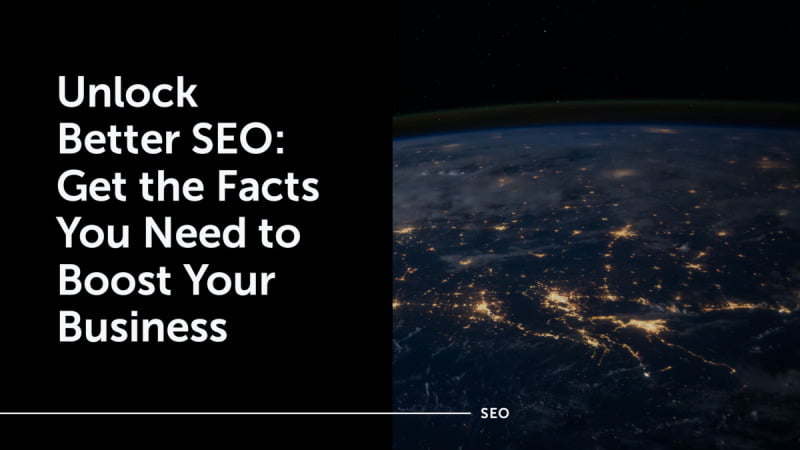Six Goals for Better SEO
Make changes to your content and improve your authority with
- SEO Tips for Writers
- On Page SEO
- Keyword Research
- Click Through Rates
- Technical SEO
- Content Marketing & Page Rank
What is SEO?
Search Engine Optimisation (SEO) is the technique of optimising websites and content to improve search engine page visibility and ranking.
The ultimate goal of SEO is to gain higher visibility, attract more targeted visitors, grow online presence and drive organic (non-paid) traffic to your website from search engines.
SEO involves keyword research, creative copywriting, on-page optimisation, link building, and technical optimisation.
👉 Your business will use SEO techniques.
What Will I Learn In This Guide? 🤔
- How to make SEO-friendly pages.
- How to target quality organic traffic.
- Learn on-page SEO basics.
You’ll also learn the basic bullets of structure and technical SEO.
Let’s get started 😎
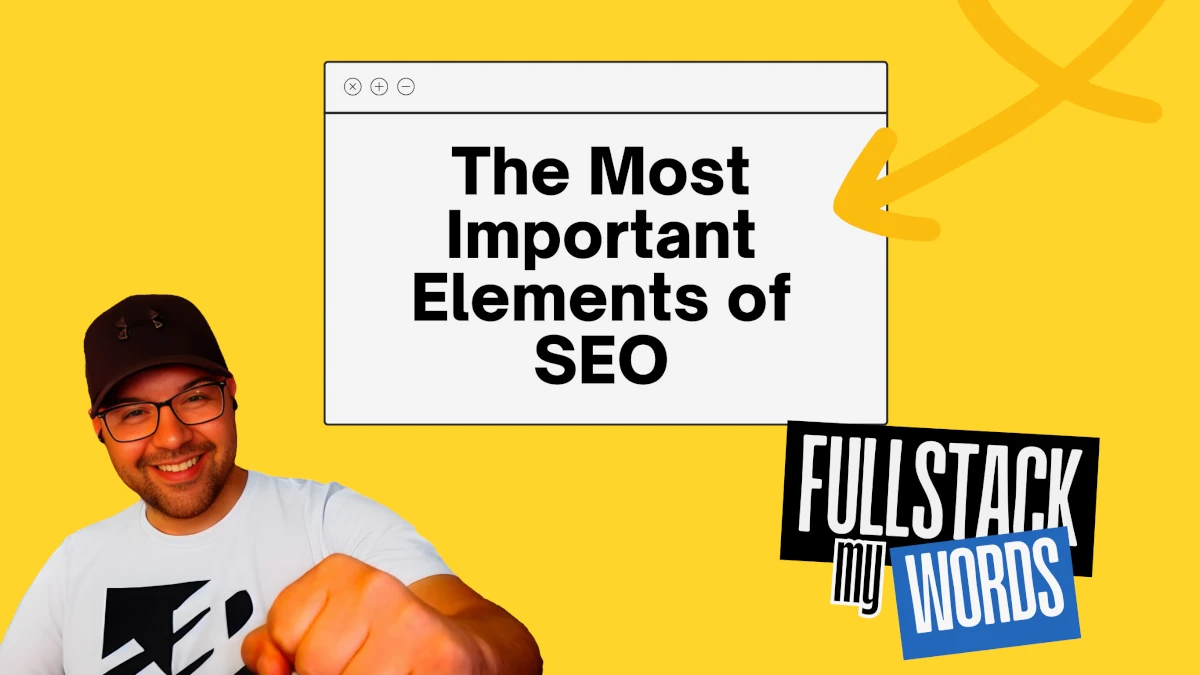
Table of Contents
On Page SEO for Writers and Creators
One non-technical and specific area of SEO that content creators can focus on is on-page optimisation.
Focusing on web page standards will result in a better search engine rank.
5 On-Page SEO Tips for Writers
- Specificity
- Write content on relevant, niche topics
- Use keyword variations and long-tail phrases
- Simple and Unique
- Ensure that your content is unique, readable, and straightforward
- Knowledge and Research
- Choose a niche
- Research your topic broadly
- Concentrate on writing about relevant issues
- Write from your audience’s experience and perspective
- Natural
- Do not insert keywords in-organically in your writing
- Your key phrases and variants will appear inherently
- Write better, more focused content as a creator
- Audience
- Think of your reader first
- Hook with your headlines
- Tell a story
- Stay on topic
- Draw readers in and to the end
The Basics of On-Page SEO Standards
We will discuss meta tags, conversion rates and click-through rates later.
Let’s start with the basics of On-Page SEO.
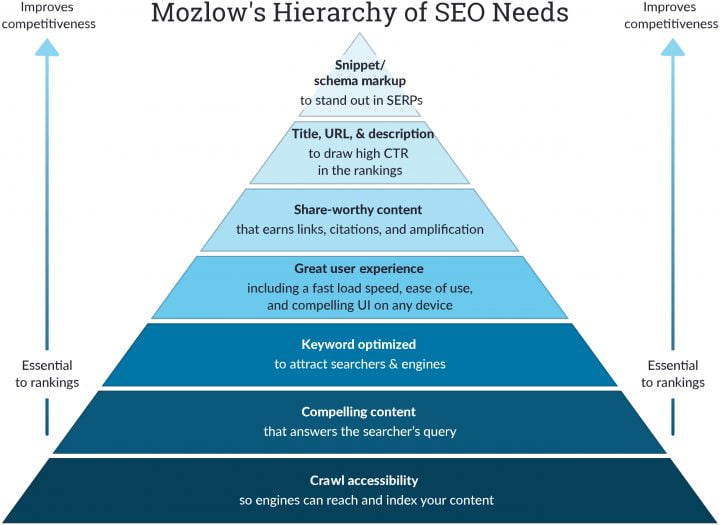
Source: Moz
Content and On-Page Text
Content quality, and, Yes, that’s right, I’m going to mention the actual text on the page.
If you want to rank for ‘blue widgets’ you’d better be talking about
- ‘widgets’
- ‘gadgets’
- ‘gizmos’, and specifically blue ones!
Produce high-quality, engaging, and valuable content for users that meets the needs of your target audience.
Page Title Tags
Particularly important to on-page SEO are your HTML Page Title Tags.
Your page titles are often displayed on SERPS (Search Engine Results Pages).
<title>My First Page Title: This Rocks</title>
In turn, page titles, relate to CTR (Click Through Rate) too.
- Each page of your website should have a unique and relevant title.
- Every webpage title needs to accurately describe your webpage’s content.
Create unique, accurate page titles that describe the content of each page concisely.
Heading Tags
These are your page and paragraph headings.
Write a clear and relevant heading (H1 tag) that accurately represents the page’s topic and the target keyphrase. Place this as the top of your page’s content.
- Grouping Headings:
Each section and subsection of your page content should be subtitled using heading tags hierarchically e.g. your page content should be using a hierarchy of h1, h2, h3 etc.
- Segment further:
In addition to subtitles and paragraphs, use bullet points.
- Scanability:
Readers will scan your page. Make this easier; use spacing, proximity and grouping.
- Keep it simple:
Segmentation will support simple reading and reduce reader’s cognitive load.
<h1>Using HTML Headings</h1>
<p>Use HTML headings to structure and
chunk your content for better organisation
and readability.<p>
<h2>Using Heirarchy In Logical Order</h2>
<p>HTML heading hierarchy is vital for SEO as search
engines rely on headings to understand webpage
structure and content.
<h3>Subsection Heirarchy, Logical H3</h3>
Organising your headings in logical order helps search
engines identify the most critical topics and boost
your search results rankings.</p>
Structuring your content with logical headings (H1, H2, H3, etc.) makes it easier for users and search engines to follow.
Link Anchor Text
Websites generally contain three distinct types of content:
- text, images, and rich media.
Websites also have links.
The main point of the World Wide Web was to share community data. This was achieved by hyperlinking pages together.
A hyperlink will have text, this is the anchor text.
<a href="https://www.orebix.com/bob-james">
Bob James SEO 👈
</a>
When linking to other parts of your website, make the anchor text relevant to the linked page.
Use descriptive anchor text for internal and external links to provide context.
Don’t use “Read More” or “Home”. Instead, describe the link destination.
Page URLs
Make sure to specify the page URL, sometimes called a slug or permalink.
The slug is the address part of your page URL after your domain name.
When setting the URL slug, make sure it is short and easy to read.
Set a standard, use lowercase letters and hyphens to separate words.
Optimize your URL structure to be concise, descriptive, and user-friendly.
Use https:// and make sure both non-www and www all resolve to one url. When doing this, url canonicalisation, remember, urls are case-sensitive.
Create a sitemap to help search engines discover and understand your website’s structure.
Describe Images with Alt-Text and Filenames
When using images, make sure to specify the alt text and use descriptive filenames..
<img src="/bob-james.webp" alt="Bob James"/>
Vision-impaired users can then understand the context.
Search engines will read the image alt text and filename too.
SEO Essentials: On Page SEO in Google Search
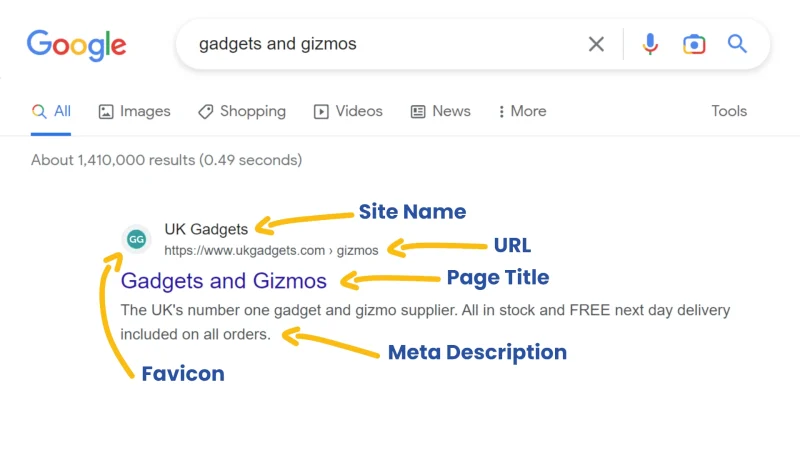
Meta Tags & Click Through Rates
Meta tags are a HTML tag that go into the <head> tag of an HTML document.
The two meta tags I talk about here are the ‘description’ and ‘keywords’ tags.
<meta name="description" content="I am the page description">
<meta name="keywords" content="put, your, keywords, here">
Now, these tags are relics when it comes to SEO.
I don’t care to complete the ‘keywords’ tag at all, in fact I don’t have one!
The description however, although directly unrelated to SEO ranking factors, is still important.
Under your search engine link result, a snippet of text is displayed.
Search engines may still use these descriptions as a snippet in their search engine results pages, SERPs. A search engine may display text other than the meta description as their snippet. Having a unique, relevant and well formed meta description is best practice.
This is where you should entice potential visitors to click your link over others.
Use descriptive meta tags to provide a brief summary of the page’s content and differentiatie your result.
<meta name="description" content="The UK's number one
gadget and gizmo supplier. All in stock and FREE next
day delivery included on all orders.">
Things like ‘Free Delivery’ or ‘In Stock’ are effective.
This will improve your CTR, Click-Through Rate.
Many of your Unique Selling Points, USPs, will affect CTR.
Differentiate your brand from the competition.
Keyword Research and Target Audience
Keyword research is the process of researching and gathering keywords related to your business, products, or services.
Firstly, you must know your subject matter.
Secondly, you must know your audience.
- Which questions do your target audience need answering?
- How does your audience search for answers?
- What exact search phrases do your audience search for?
The results from your research will affect your entire creative process.
When starting a new project, choose your niche carefully and pick the right ‘long tail’ phrase(s).
Know what your users are looking for and what they want. Understand the different keywords and search queries used by your audience.
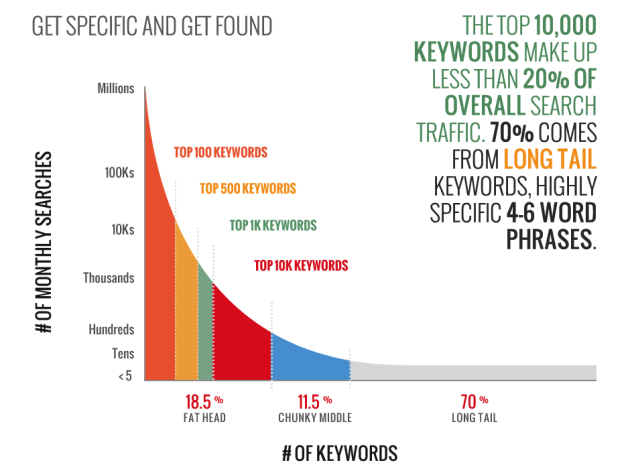
Source: Raven
Keyword Research Key Bullet Points
- Keyword research applies to
- Content Creation
- Advertising
- Knowing Your Audience
- SEO
- Content creators can make use of Keyword Research in the first stages of ideation.
- SEO, for any phrase, should start with Keyword Research.
- Know The Keywords Search Volume
- Know The Competition
- Know The Keyword Difficulty
What’s Next in your SEO Checklist Bob?
You’ve completed your research, chosen your niche, identified target pain points, and started writing to engage your audience.
What’s next in the SEO essentials checklist?
Structure and Technical SEO
As a business owner, you need to delegate.
You don’t need to know all the technical details.
A search engine, like Google, will take into consideration, I would say ~400 metrics when its ranks your website.
This includes areas like technology implementation.
Is Your Website Crawlable?
The first technical SEO check, to getting your site on a search engine like Google, is to make sure that a search engine crawler can access your content.
Ensure your website is discoverable and crawlable by search engine crawlers.
Display Breadcrumb List Navigation
A breadcrumb list is a helpful awareness and navigation feature consisting of a row of internal links positioned at the top or bottom of a webpage.
The purpose of Breadcrumb lists is to inform users of their current location on your website and to facilitate easy navigation back to a previous section or the root page.
Areas Of Technical SEO Implementation
Here is a quick list additional areas of implementation I consider Technical SEO.
- JavaScript and code implementations
- Structured data / Schema markup
- Server-side implementations
- Cross-platform implementations
- HTTP headers / compression & minification
- Security standards
- Load times, performance, delivery
- Ease of crawling, linking, accessibility, broken links
- Duplicate content, keyword cannibalisation and URL canonicalisation
Web Content Accessibility Guidelines
Website accessibility refers to designing and developing websites that ensure equal access and usability for all individuals, regardless of their abilities or disabilities.
Adhere to accessibility guidelines and standards to ensure your website is perceivable, operable, understandable, and robust.
Web Content Accessibility Guidelines (WCAG) considerations include:
- Providing alternative text for images
- Using proper heading structures
- Ensuring keyboard accessibility
Site Structure
Structure your site in a way that makes sense.
A core aspect of every SEO strategy is analysing, organising, and improving site structure.
If you are starting a new project, begin by laying a good foundation and future proof it.
Think about how to categorise, group, and link your content.
Are you going to have a mega menu and footer links?
Think about taxonomies, categories, tags, and custom fields too.
Understand the importance of structure to avoid future structural changes.
If you keep changing your site structure, Google will never get to index it completely.
All this will support your visitor’s experience too, including Google bot visits.
Website Performance, Speed and UX
Website performance, page speed, and user experience (UX) are closely interconnected aspects that significantly impact the success of a website.
A fast-loading website enhances user experience and contributes to better search engine rankings.
Optimize your website’s loading speed to improve user experience and search engine rankings.
If you think about it, a search engine needs to provide links to quality sources. They are less likely to send their users to websites that provide a poor experience.
Make sure your website works well on all devices for all screen sizes. This includes Desktop, Laptop, Tablet, Mobile and TV screens.
Content Marketing, Social and Backlinks
Then Google’s Head of Search Quality, Matt Cutts, released this video in 2014.
Matt is saying that social signals do not affect search rankings.
However, authoritative links back to your content are important.
Gaining exposure through social media will encourage others to read and attract organic backlinks to your content.
Links gained through content marketing, or otherwise, will make a difference.
Quality organic links will impact the traffic you get and the pages that rank.
Most Important Elements of SEO:
the Final Word
What SEO do you need to know as a business owner? What are the key areas for optimum SEO?
I’ve comprehensively outlined the basics; but moving your business forward, it cannot just be about SEO anymore.
The most important SEO key takeaways for business owners today are:
- SEO is highly entangled with many other aspects of your business
- SEO must be considered part of your entire business marketing strategy
At the end of the day, it’s about you and your business. Your people and your message. Your business process and operations.
Ask yourself, are you servicing the needs of your workers, clients, customers, and audience?
As a freelancer, manager or owner, SEO is only one part of the working machine that makes up your business strategy.
And while SEO may be a small part of your business, practicing the SEO points raised in this article will have a massive impact across the board.



